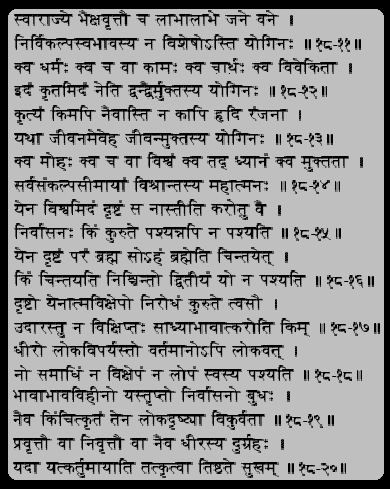



Ashtavakra said:
The dominion
of heaven or beggary, gain or loss, life among men
or in the forest, these make no difference to a yogi whose
nature it is to be free from distinctions. 18.11
There are no
religious obligations, wealth, sensuality, or discrimination
for a yogi free from such opposites as "I have done this,"
and "I have not done that." 18.12
There is
nothing needing to be done or any attachment in his heart
for the yogi liberated while still alive. Things things will last
just to the end of life. 18.13
There is no
delusion, world, meditation on That, or liberation
for the pacified great soul. All these things are just the
realm of imagination.18.14
He by whom
all this is seen may well make out it doesn't exist,
but what is the desireless one to do? Even in seeing it he
does not see it. 18.15
He by whom
the Supreme Brahma is seen may think "I am Brahma,
" but what is he to think who is without thought, and
who sees no duality? 18.16
He by whom
inner distraction is seen may put an end to it, but the
noble one is not distracted. When there is nothing to achieve
what is he to do? 18.17
The wise
man, unlike the worldly man, does not see inner stillness,
distraction, or fault in himself, even when living like
a worldly man. 18.18
Nothing is
done by him who is free from being and non-being, who is
contented, desireless, and wise, even if in the world's eyes
he does act. 18.19
The wise man
who just goes on doing what presents itself for him to do,
encounters no difficulty in either activity or inactivity. 18.20
[Translation by John Richards]